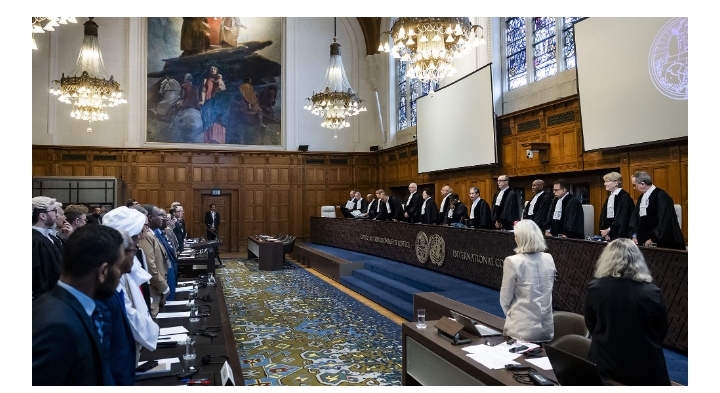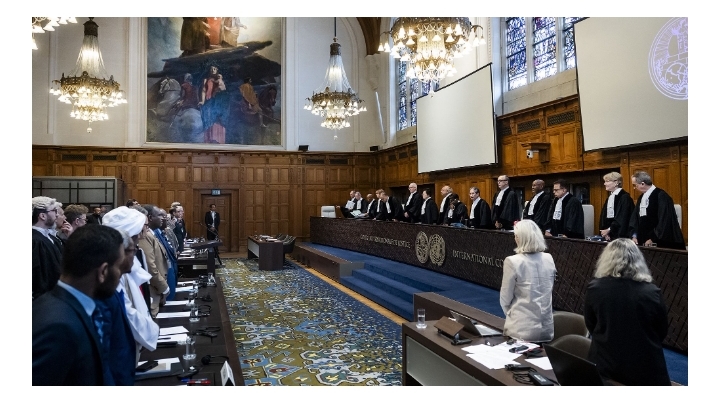NEWS
Breaking News: Top UN court dismisses Sudan’s genocide case against UAE…see below 👇their reasons.

Breaking News: Top UN court dismisses Sudan’s genocide case against UAE…see below 👇their reasons.
Top UN Court Dismisses Sudan’s Genocide Case Against UAE: A Detailed Analysis
On May 5, 2025, the International Court of Justice (ICJ), the principal judicial organ of the United Nations, dismissed a case brought by Sudan accusing the United Arab Emirates (UAE) of violating the 1948 Genocide Convention by allegedly arming and funding the Rapid Support Forces (RSF) in Sudan’s ongoing civil war. The ICJ ruled by a vote of 14-2 that it lacked jurisdiction to hear the case, effectively ending Sudan’s pursuit of emergency measures to halt violence against the Masalit ethnic group in Darfur. This decision has sparked significant discussion about international law, state sovereignty, and the complexities of addressing atrocities in Sudan’s devastating conflict. This article provides a comprehensive overview of the case, its background, the legal arguments, the court’s ruling, and the broader implications.
Background: Sudan’s Civil War and Allegations of Genocide
Sudan has been engulfed in a brutal civil war since April 2023, when tensions between the Sudanese Armed Forces (SAF), led by General Abdel Fattah al-Burhan, and the paramilitary Rapid Support Forces (RSF), commanded by General Mohamed Hamdan Dagalo (known as Hemeti), erupted into open conflict. The war, initially centered in the capital, Khartoum, has spread across the country, including to the western region of Darfur, a historical epicenter of violence. The conflict has resulted in catastrophic humanitarian consequences, with over 20,000 deaths (likely an underestimate), 12.6 million people displaced, and famine declared in parts of the country. The World Food Programme estimates that nearly 25 million Sudanese—half the population—are facing extreme hunger.
In Darfur, the RSF and allied Arab militias have been accused of committing atrocities against non-Arab ethnic groups, particularly the Masalit community in West Darfur. These attacks, documented by Reuters, Human Rights Watch, and the UN, include mass killings, rape, forced displacement, and destruction of property, with the United States declaring in January 2025 that the RSF’s actions constituted genocide. Sudan’s military government, unable to directly sue the RSF at the ICJ (as the court handles disputes between states), targeted the UAE, alleging that the Gulf state’s financial, political, and military support for the RSF enabled these atrocities.web:8porarymeasuresweb:8
Sudan’s accusations centered on the UAE’s alleged provision of arms, logistical support, and funding to the RSF, including weapons shipments via Chad and the operation of RSF-affiliated businesses in the UAE. A UN panel of experts and U.S. lawmakers found these allegations credible, and in January 2025, the Biden administration imposed sanctions on seven RSF-owned companies based in the UAE. Sudan argued that the UAE’s support was a “primary driving force” behind the genocide, violating its obligations under the Genocide Convention to prevent and punish such acts.
The Case: Sudan v. United Arab Emirates
On March 5, 2025, Sudan filed an application with the ICJ, formally titled Application of the Convention on the Prevention and Punishment of the Crime of Genocide in Sudan (Sudan v. United Arab Emirates). The case accused the UAE of complicity in genocide through its “direction of and provision of extensive financial, political, and military support” for the RSF. Sudan requested provisional measures—urgent court orders—to compel the UAE to:

Take all measures to prevent genocidal acts against the Masalit.
Ensure that any armed units or individuals under its influence refrain from such acts.
Pay reparations to victims of the war.
Hearings began on April 10, 2025, in The Hague. Sudan’s acting justice minister, Muawia Osman, told the court, “A genocide is being committed against the ethnic group of the Masalit in the west of our country,” with the “support and complicity of the United Arab Emirates.” Sudan’s legal team, including Professor Eirik Bjorge, presented evidence of UAE-backed arms deliveries through Chad’s Amdjarass airport and cited the RSF’s use of sophisticated weaponry as proof of external support.
The UAE, represented by Reem Ketait, Deputy Assistant Minister for Political Affairs, vehemently denied the allegations, calling the case a “cynical publicity stunt” aimed at deflecting attention from the SAF’s own atrocities. The UAE argued that it had not provided arms to either warring party and had instead focused on humanitarian efforts, such as establishing field hospitals in Chad and South Sudan. Crucially, the UAE contended that the ICJ lacked jurisdiction due to a reservation it made to Article IX of the Genocide Convention, which governs the court’s authority over disputes related to the treaty.
The ICJ’s Ruling: Lack of Jurisdiction
On May 5, 2025, the ICJ delivered its order, dismissing Sudan’s case and declining to issue provisional measures. The court ruled that it “manifestly lacked” jurisdiction, primarily due to the UAE’s reservation to Article IX of the Genocide Convention. This reservation, made when the UAE acceded to the treaty in 2005, exempts it from ICJ jurisdiction over Genocide Convention disputes. The court found the reservation valid, consistent with prior rulings involving similar reservations by the United States, Spain, and Rwanda.
The 14-2 vote reflected near-unanimity among the judges, who ordered the case removed from the court’s docket. The decision effectively ended Sudan’s attempt to secure emergency measures and halted further proceedings on the merits of the case.
The UAE welcomed the ruling, with Ketait stating, “The Court’s finding that it is without jurisdiction confirms that this case should never have been brought.” She accused Sudan of using the ICJ as a stage for misinformation and to distract from its own responsibility for atrocities. Sudan, meanwhile, did not immediately respond to the ruling, but its legal team had previously argued that the UAE’s reservation was ambiguous and potentially invalid, as it conflicted with the Genocide Convention’s object and purpose. This argument, however, failed to persuade the court.
Legal and Political Implications
The ICJ’s dismissal of the case highlights several critical issues in international law and geopolitics:
Jurisdictional Limits of the ICJ: The ruling underscores the constraints of the ICJ’s authority, which depends on state consent. Reservations to treaties like the Genocide Convention allow states to opt out of ICJ jurisdiction, limiting the court’s ability to address allegations of serious crimes. Legal experts, including former UN prosecutor Richard Goldstone, had urged the ICJ not to dismiss the case on a “technicality,” arguing that such reservations should not shield states from accountability. However, the court’s precedent in cases like Armed Activities and Ukraine v. Russia supported the validity of Article IX reservations.
Challenges in Proving Complicity: Even if the ICJ had jurisdiction, Sudan faced a high bar to prove the UAE’s complicity in genocide. The Genocide Convention defines genocide as acts committed with “intent to destroy, in whole or in part, a national, ethnical, racial, or religious group.” Establishing that the UAE knowingly supported the RSF’s genocidal intent would have required robust evidence, which Sudan’s legal team attempted to provide through intelligence reports and UN findings.
Geopolitical Dynamics: The case reflects broader regional rivalries, with analysts suggesting the UAE’s alleged support for the RSF stems from its desire to counter Saudi influence, exploit Sudan’s resources (e.g., gold exports to the UAE), and suppress political Islam. The UAE’s denial of involvement, despite credible evidence, highlights the difficulty of holding powerful states accountable, especially when they are U.S. allies.
Humanitarian Crisis: The dismissal does little to alleviate Sudan’s humanitarian catastrophe. The ICJ’s lack of enforcement power, even in cases where it issues orders (e.g., Russia in Ukraine, Israel in Gaza), underscores the gap between legal rulings and on-the-ground impact. Civilians, particularly the Masalit, continue to face violence, starvation, and displacement, with aid programs like those of Mercy Corps facing funding cuts.
Reactions and Sentiment
The ruling elicited varied responses. Posts on X reflected polarized views: some praised Sudan’s legal team for presenting a strong case, with one user stating, “The evidence was stacked, the arguments were solid,” while others noted the jurisdictional hurdle from the outset, citing the UAE’s Article IX reservation. Media outlets like Al Jazeera and CNN emphasized the humanitarian stakes, while the UAE’s UN mission celebrated the decision as a rejection of Sudan’s “misinformation.”
Legal experts expressed disappointment but not surprise. Michael Becker, an international law scholar, had predicted the case’s dismissal due to the UAE’s reservation, a view echoed by others who noted the court’s consistent stance on such opt-outs. Meanwhile, human rights groups like Action for Sudan, which organized protests against the UAE’s alleged role, continue to advocate for accountability.
Broader Context: Darfur’s History of Violence
The case must be seen in the context of Darfur’s long history of violence. Two decades ago, the region became synonymous with genocide when Janjaweed militias, precursors to the RSF, targeted non-Arab groups, killing up to 300,000 and displacing 2.7 million. The current conflict, while rooted in a power struggle between the SAF and RSF, has reignited these ethnic tensions, with the Masalit again bearing the brunt of targeted attacks. The RSF’s actions in El Geneina, West Darfur, have been described as ethnic cleansing and crimes against humanity by Human Rights Watch and the UN.
The ICJ’s dismissal does not negate these atrocities or the evidence of external support for the RSF. It instead highlights the limitations of international justice in addressing ongoing crises, particularly when powerful states are involved.
Conclusion
The ICJ’s dismissal of Sudan’s genocide case against the UAE on jurisdictional grounds is a setback for Sudan’s efforts to hold foreign actors accountable for their alleged role in Darfur’s atrocities. While Sudan presented compelling evidence of the UAE’s support for the RSF, the UAE’s reservation to the Genocide Convention’s jurisdictional clause proved an insurmountable barrier. The ruling reinforces the challenges of enforcing international law in the face of state sovereignty and geopolitical interests.
For the Masalit and millions of Sudanese caught in the civil war, the decision offers no immediate relief. The conflict continues to devastate lives, with famine, displacement, and violence unabated. The case, though dismissed, has drawn global attention to the UAE’s alleged role and the broader dynamics fueling Sudan’s crisis. As diplomatic efforts falter and humanitarian needs grow, the international community faces renewed pressure to address the root causes of the conflict and support Sudan’s beleaguered population.












